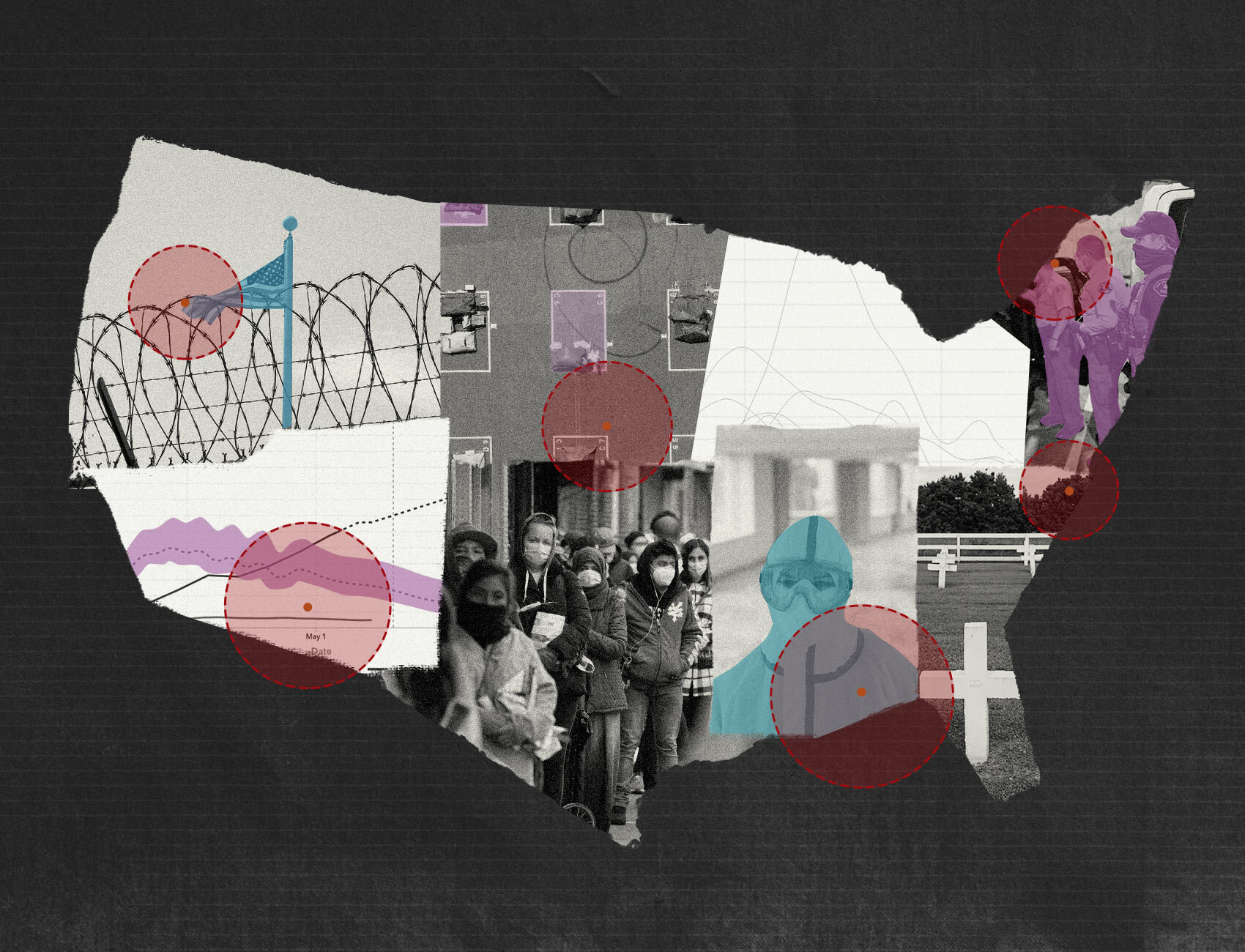Coronavirus In Jails and Prisons
Despite early warnings, jails and prisons have seen a rapid spread of the virus—a humanitarian disaster that puts all of our communities, and lives, at risk. Every day, The Appeal examines the scale of the crisis, numbers of infected and dead, around the nation.

Weeks before the first reported cases of COVID-19 in prisons and jails, correctional healthcare experts warned that all the worst aspects of the U.S. criminal justice system — overcrowded, aging facilities lacking sanitary conditions and where medical care is, at best, sparse; too many older prisoners with underlying illnesses; regular flow of staff, guards, healthcare workers in and out of facilities — would leave detention facilities, and their surrounding communities, vulnerable to outbreaks. Despite those early warnings, even jails and prisons that believed they were well-prepared have seen a rapid spread of the virus. On a daily basis over the next several months, The Appeal will be examining the coronavirus crisis unfolding in U.S. prisons and jails, COVID-19’s impact on surrounding communities and how the virus might reshape our lives. Find daily updates here from Thursday and Friday.
In a Monday morning phone call, Donald Trump urged governors to be more aggressive with people protesting the death of George Floyd, the 46-year-old black man killed last Tuesday by white Minneapolis police officer Derek Chauvin.
“You’ve got to arrest people,” Trump said. “You have to track people, you have to put them in jail for 10 years and you’ll never see this stuff again.”
In normal times, Trump’s statement would be just mindlessly punitive. Amid the coronavirus pandemic, jails and prisons are among the country’s top hotspots for outbreaks, so the president’s rhetoric is deadly. Even jails that had gone weeks without a case are now reporting their first positive tests. Ironically, Chauvin himself was moved between multiple county jails to eventually a state correctional facility because of COVID-19. This morning’s Newsweek headline: “Derek Chauvin Moved From Detention Facility Over Coronavirus Fears as Protesters Fill Up Jails.”
A look at other recent news highlights about the spread of the virus in jails and prisons:
- Late last week, a federal judge in Orange County found that Sheriff Don Barnes displayed “deliberate indifference” toward people housed in the county’s three jails, where 377 people have tested positive for COVID-19. The ruling came in response to a lawsuit by the ACLU of Southern California seeking the release of medically vulnerable prisoners. U.S. District Judge Jesus G. Bernal denied the request, the L.A. Times reported, but ordered Barnes to provide each person in his custody with hand soap, paper towels, adequate clean supplies and disinfectant hand wipes—as well as ensure there’s enough space for prisoners to remain six feet apart. Barnes said he’d appeal the ruling and has requested a stay from the Ninth Circuit Court. Jacob Reisberg, a jail conditions advocate with the ACLU, told The Appeal that unless the stay is granted, Barnes must immediately implement the judge’s order.
- Tuscaloosa County, Alabama, has seen a surge in COVID-19 cases over the last two weeks, AL.com reports, partly due to an outbreak in the county’s jail. The jail reported its first positive case in mid-May. Because the person was living in a dorm-style setting, the virus spread quickly, infecting 20 others, plus a staff member.
- In a recent report, Dr. Homer Venters, the former medical director for New York City jails and an expert in correctional healthcare, described practices at Manhattan’s Metropolitan Correctional Center as “actually promot[ing] a more rapid spread of COVID-19 inside the facility.” Venters toured the facility at the request of a group of attorneys who’ve filed a class action lawsuit on behalf of incarcerated people there. Venters also found infestations of mice, rats and roaches and a “basic disregard for sanitation and infection control.” (The Intercept first reported Venters findings.) In August, Jeffrey Epstein died by suicide at The Metropolitan Correctional Center, and the federal facillity has been long known for dangerous conditons of confinement. Its new warden, Marti Licon-Vitale blamed conditions on staffing shortages, saying that nearly a quarter of the facility’s 200 guards had been ill with COVID-19.
- Venters also toured New York’s Sullivan County jail, finding conditions there just as bad, if not worse, than The Metropolitan Correctional Center. On May 13, the jail announced its first positive test. By May 18, that number of positives grew to more than 30, according to the Mid Hudson News. By May 29, the ACLU of New York filed a lawsuit on behalf of four medically vulnerable people. One of the petitioners, Toni Dilauro, has severe asthma. In April, Dilauro was booked at the jail on a technical parole violation—she failed to report a change of address—and is scheduled for release on Aug. 24. In a sworn affidavit, Dilauro said she tested positive for coronavirus on May 16 after feeling ill for several days. On May 26, still feeling ill, Dilauro began coughing up blood. “Welcome to COVID,” a nurse told her when she sought medical attention.
